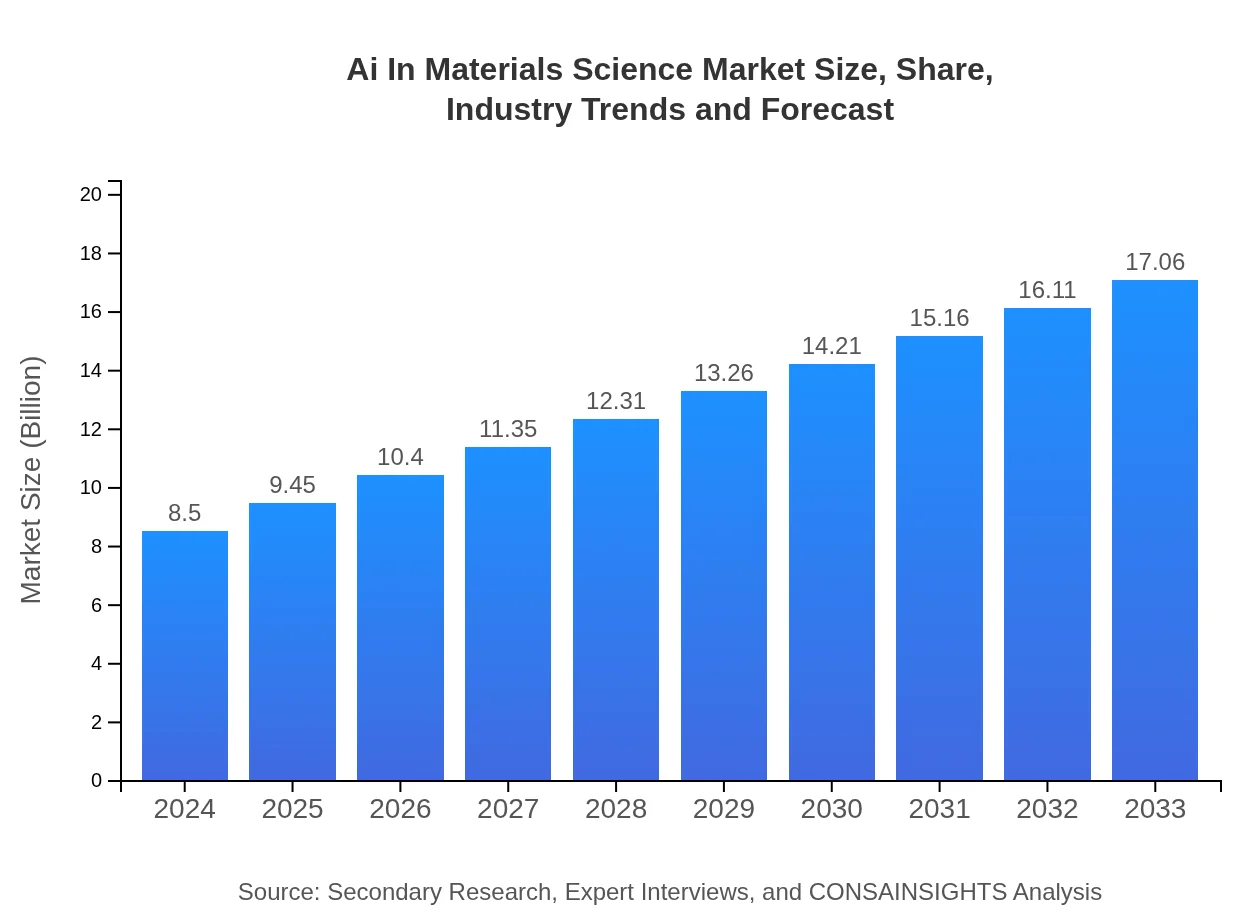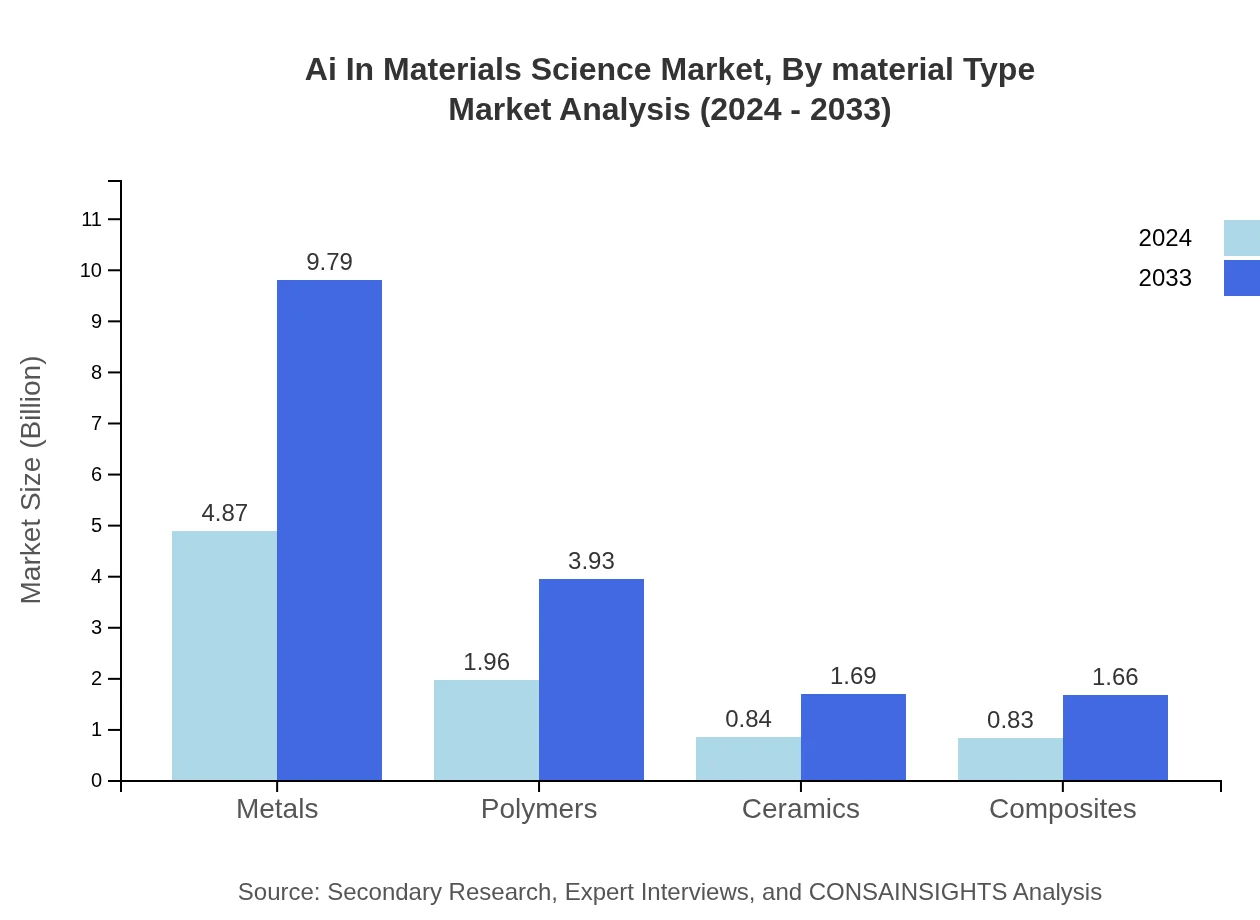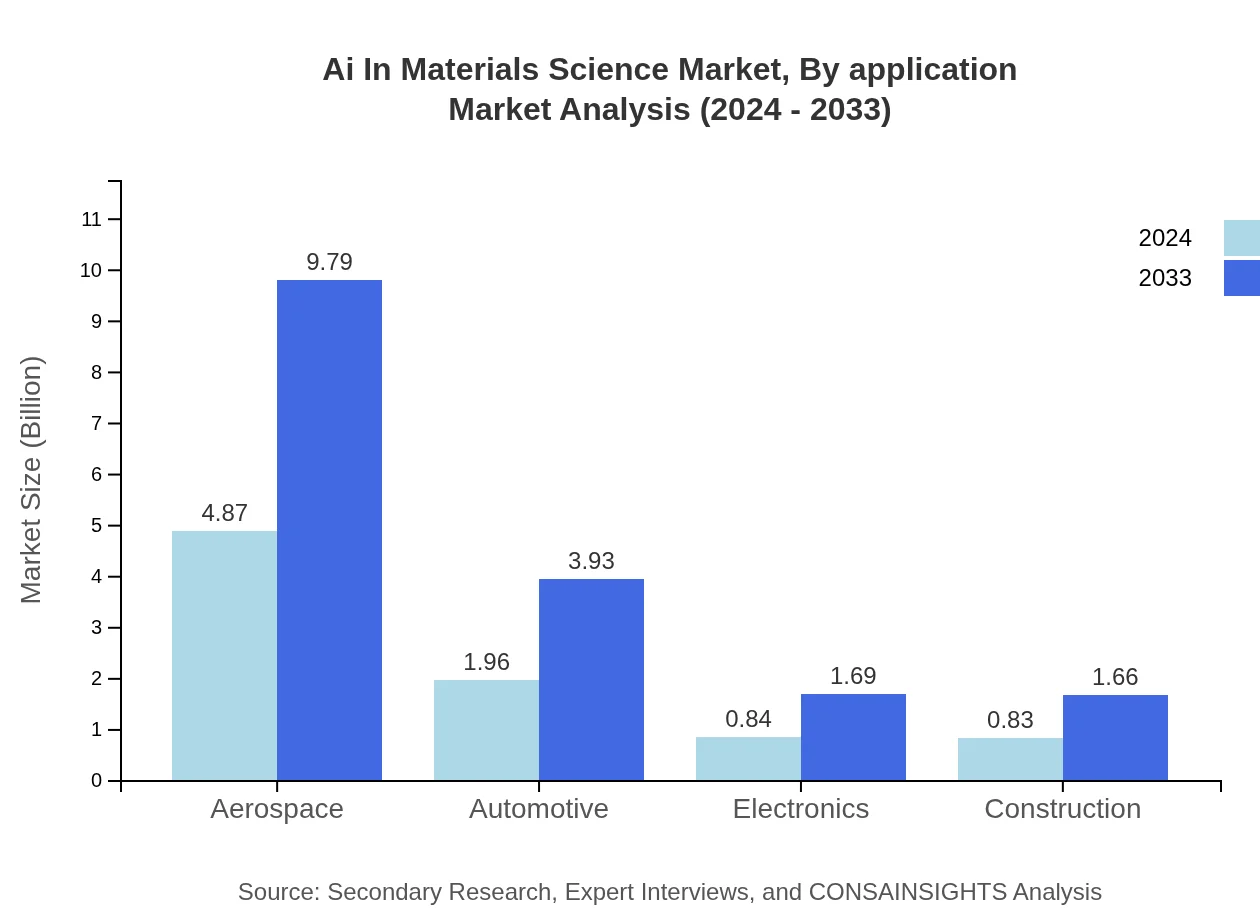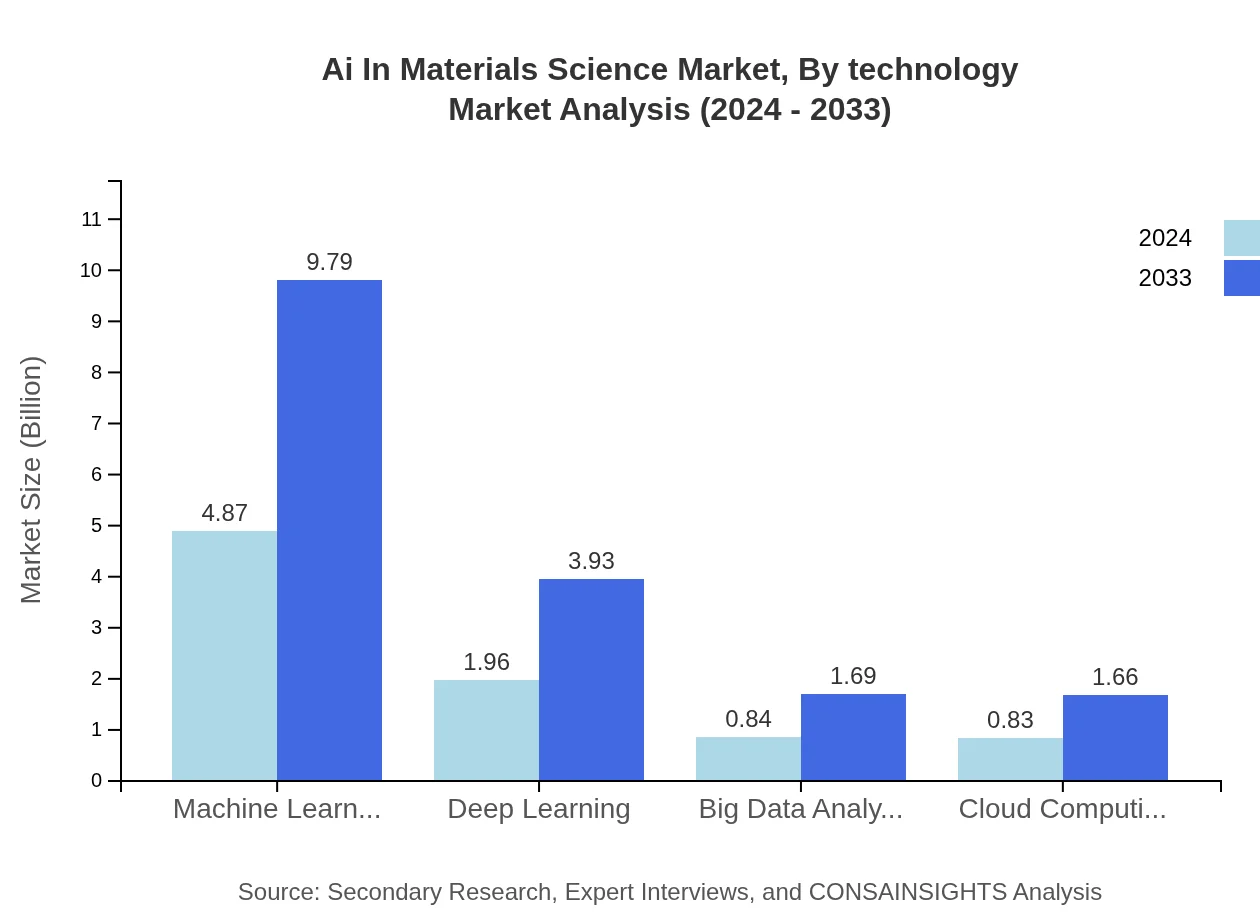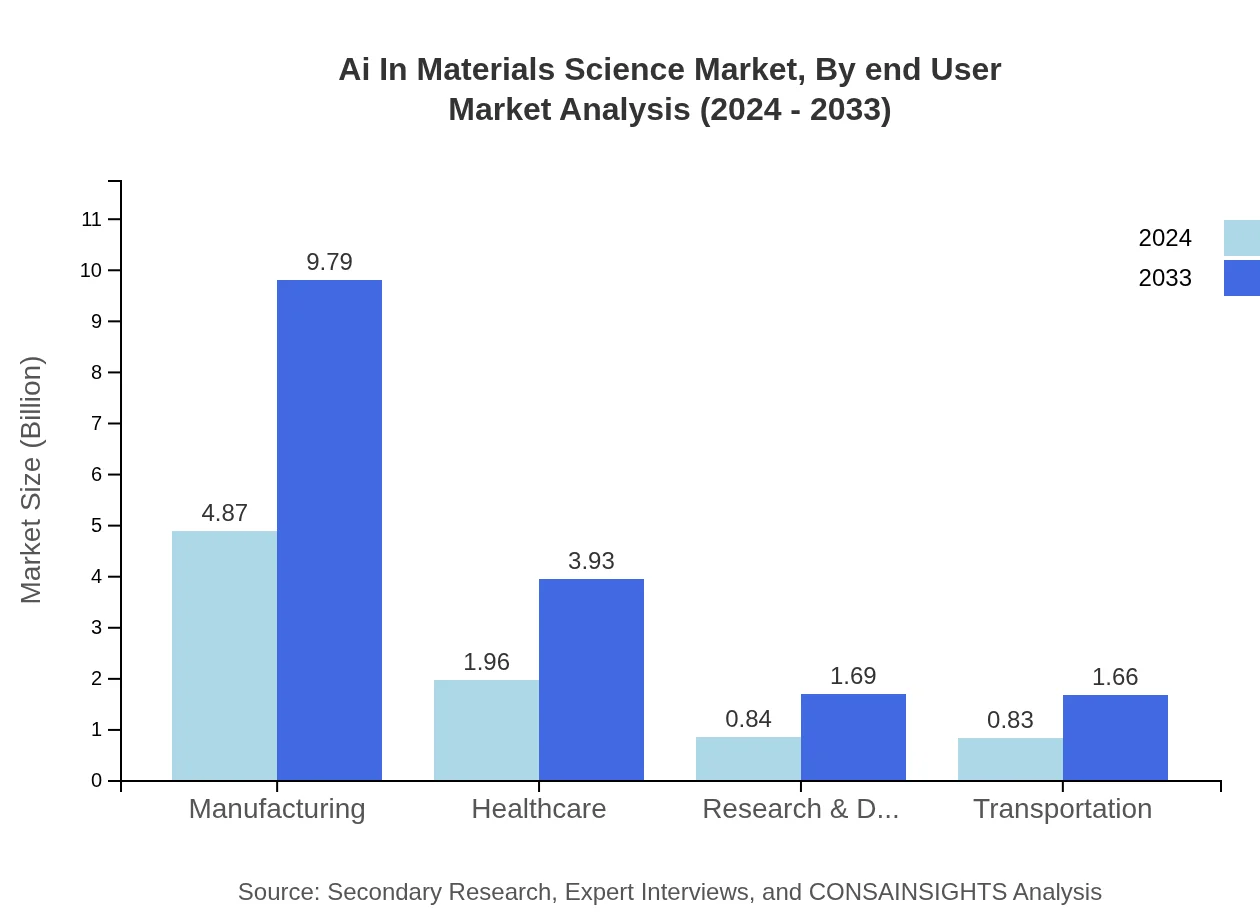Ai In Materials Science
Published Date: 02 February 2026 | Report Code: ai-in-materials-science
Ai In Materials Science Market Size, Share, Industry Trends and Forecast to 2033
This comprehensive report examines the transformative role of artificial intelligence in materials science, detailing market evolution, emerging innovations, and integrated technological solutions. Covering the forecast period from 2024 to 2033, the report provides in‐depth insights into market size, regional expansion, segmentation strategies, and competitive dynamics to guide investments and future research initiatives.
| Metric | Value |
|---|---|
| Study Period | 2024 - 2033 |
| 2024 Market Size | $8.50 Billion |
| CAGR (2024-2033) | 7.8% |
| 2033 Market Size | $17.06 Billion |
| Top Companies | TechMaterials Inc., Innovative Algorithmics, MaterialSense Technologies, NextGen Composites |
| Last Modified Date | 02 February 2026 |
Ai In Materials Science Market Overview
Customize Ai In Materials Science market research report
- ✔ Get in-depth analysis of Ai In Materials Science market size, growth, and forecasts.
- ✔ Understand Ai In Materials Science's regional dynamics and industry-specific trends.
- ✔ Identify potential applications, end-user demand, and growth segments in Ai In Materials Science
What is the Market Size & CAGR of Ai In Materials Science market in 2024?
Ai In Materials Science Industry Analysis
Ai In Materials Science Market Segmentation and Scope
Tell us your focus area and get a customized research report.
Ai In Materials Science Market Analysis Report by Region
Europe Ai In Materials Science:
Europe is characterized by its mature industrial landscape and is witnessing steady growth in AI adoption within materials science. With a market size of 2.04 units in 2024 and an anticipated rise to 4.10 units by 2033, European countries are emphasizing sustainable material development, energy efficiency, and precision engineering. Collaborative initiatives between research institutions and industry leaders are key factors driving this growth.Asia Pacific Ai In Materials Science:
The Asia Pacific region is emerging as a pivotal market for AI-driven material innovations, driven by robust industrial growth and increasing government investments in smart technologies. In 2024, the market size stood at 1.76 units and is projected to nearly double to 3.52 units by 2033. This region benefits from a strong manufacturing base, a growing middle-class population, and extensive R&D capabilities, making it an attractive destination for technology-driven material research and development.North America Ai In Materials Science:
North America remains a dominant force with a market size of 3.13 units in 2024, growing significantly to 6.29 units by 2033. The region's leadership in technology and innovation, combined with strong academic-industry collaborations and substantial R&D funding, positions it at the forefront of AI applications in materials science. This robust ecosystem facilitates cutting-edge research and accelerates product commercialization.South America Ai In Materials Science:
South America, though smaller in scale with a market size of 0.71 units in 2024 and an expected increase to 1.43 units by 2033, is rapidly adopting AI and digital transformation within its material sciences sectors. Innovations and improved infrastructures are paving the way for increased investments, particularly in industries related to natural resources and energy-efficient construction materials.Middle East & Africa Ai In Materials Science:
In the Middle East and Africa, the market is marked by a moderate beginning of 0.86 units in 2024 with projections to advance to 1.72 units by 2033. Investments in infrastructure, coupled with increasing industrial diversification and a focus on renewable energy materials, are fueling this growth. The region is gradually embracing AI integration in materials research, which is expected to unlock new potentials in both traditional and emerging sectors.Tell us your focus area and get a customized research report.
Ai In Materials Science Market Analysis By Material Type
This segment focuses on the material types that stand to gain significantly from AI integration. Critical segments such as metals, polymers, ceramics, composites, and manufacturing materials are being revolutionized by AI-driven analytics and simulation tools. These technologies are enhancing the efficiency of production processes, improving quality control measures, and facilitating the development of advanced, high-performance materials. Detailed analysis reveals that AI applications are not only reducing development time but also enabling more sustainable material design and lower environmental impact.
Ai In Materials Science Market Analysis By Application
In the application category, industries including healthcare, aerospace, automotive, transportation, and construction are leveraging AI to optimize product design and functionality. The integration of AI in these fields results in improved predictive maintenance, innovative product development, and enhanced safety features. The segment analysis illustrates how AI-powered solutions are transforming traditional applications into intelligent, data-driven processes, thereby creating new revenue streams and market opportunities for stakeholders.
Ai In Materials Science Market Analysis By Technology
Technologies such as machine learning, deep learning, big data analytics, and cloud computing are at the core of the AI revolution in materials science. This segment examines how these technologies are applied to analyze complex material behaviors and accelerate research initiatives. The advent of sophisticated algorithms is allowing for real-time data processing and enhanced simulation accuracy, which aids in the creation of innovative materials and smart manufacturing practices. Technological advancements are also helping to mitigate risks associated with material failure under extreme conditions.
Ai In Materials Science Market Analysis By End User
End-user segmentation highlights the adoption of AI across various industries including research and development, manufacturing, and commercial applications. End-users benefit from reduced costs, increased efficiency, and accelerated product development cycles. In-depth analysis of this segment indicates that sectors such as aerospace, automotive, and healthcare are investing heavily in AI solutions to gain competitive advantages. This analysis further underscores the critical role of tailored AI applications in meeting specific industry demands and driving overall market growth.
Ai In Materials Science Market Trends and Future Forecast
Tell us your focus area and get a customized research report.
Global Market Leaders and Top Companies in Ai In Materials Science Industry
TechMaterials Inc.:
TechMaterials Inc. is renowned for its innovative integration of AI with material engineering. Their cutting-edge solutions have transformed traditional methods, providing rapid material discovery and performance optimization using advanced algorithms and robotics.Innovative Algorithmics:
Specializing in AI-driven research, Innovative Algorithmics leads in developing data-centric approaches that enhance accuracy in material testing and simulation, significantly reducing time-to-market for novel materials.MaterialSense Technologies:
MaterialSense Technologies leverages machine learning and big data to drive insights in materials research. Their solutions support industries in developing high-performance materials with controlled properties and sustainable practices.NextGen Composites:
NextGen Composites focuses on integrating deep learning in composite material design, enabling innovative product development and contributing substantially to the advancement of modern material applications.We're grateful to work with incredible clients.









FAQs
What is the market size of ai In Materials Science?
The global AI in Materials Science market size is expected to reach $8.5 billion by 2033, growing at a CAGR of 7.8% from its current size. This reflects the increasing integration of AI technologies across various materials science applications.
What are the key market players or companies in this ai In Materials Science industry?
Key players in the AI in Materials Science industry include major tech firms and research institutions that focus on AI applications in manufacturing, healthcare, and automotive sectors. Their ongoing innovations shape market dynamics and influence competitive strategies.
What are the primary factors driving the growth in the ai In Materials Science industry?
Growth in the AI in Materials Science sector is largely driven by rising demand for advanced manufacturing processes, increasing research and development activities, and the need for enhanced material performance and efficiency across industries.
Which region is the fastest Growing in the ai In Materials Science?
North America is the fastest-growing region in the AI in Materials Science market, projected to reach $6.29 billion by 2033. This growth is supported by strong investments in technology and extensive research initiatives within the region.
Does ConsaInsights provide customized market report data for the ai In Materials Science industry?
Yes, ConsaInsights offers customized market report data tailored to specific needs in the AI in Materials Science industry. This customization includes in-depth analysis and insights according to unique market requirements.
What deliverables can I expect from this ai In Materials Science market research project?
Deliverables from the AI in Materials Science market research project include comprehensive reports detailing market trends, segmentation analysis, competitive landscape, and growth forecasts, providing valuable insights for strategic decision-making.
What are the market trends of ai In Materials Science?
Current market trends in AI in Materials Science highlight a rise in the adoption of deep learning and big data analytics. Innovations in sectors like healthcare and manufacturing are increasingly driven by AI capabilities, positively influencing growth.

